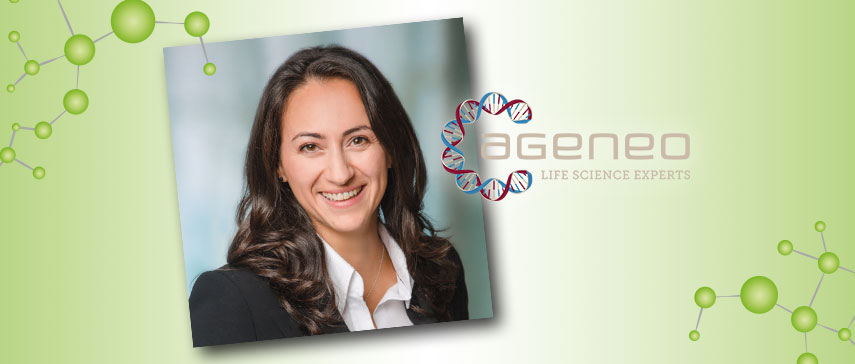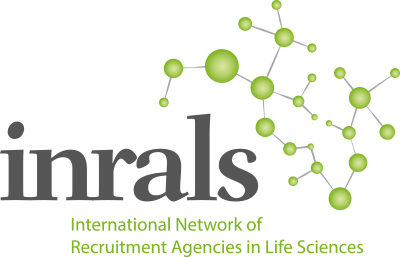
The applicant perspective – Expert Talk with Dilsâd Babayigit
August 31, 2021 - INRALS Member: ageneo Life Science ExpertsDilsâd Babayigit of our German member ageneo in conversation with Georg Kääb of Platform Life Science.*
In the first interview, we had already talked about various topics in the recruiting process in the Life Sciences, from the shortage of skilled workers to “data scientists” and the differences between SMEs and large companies to some tips for successfully filling vacancies. In the second episode, the focus was on: start-ups and recruitment issues. In this third interview, the main subject is the applicant perspective.
Plattform Life Science (PLS): In the last few conversations, we examined the process for filling vacancies from a company perspective. We only ‘touched’ the applicant perspective and want to focus on it again. Job starters in particular are often unsure which qualifications and qualities they actually have and what is ‘special’ about them. Or is today’s generation ticking differently here than it used to be, more self-confident?
Dilsâd Babayigit: The current generation is definitely different than it used to be; let’s stay with “more confident”. Most newcomers today have a clearer idea of what to expect and what an employer has to do for them than in the past. My impression is that today’s generation wants to be courted more than before. The long-standing narrative of the War for Talents certainly contributed to this. Today’s paradox, however, is that although the expectations of the employer have become much clearer, the clarity about oneself has hardly improved. Many people still find it difficult to assess themselves correctly and to know their own special qualities. At the same time, there is little awareness of what one is ready or willing to achieve.
PLS: Do you really have to “market” yourself and highlight yourself? And how do you manage not to overwind?
Dilsâd Babayigit: By realizing that nobody expects you to be able to do everything and that you have seen everything before. More and more decision-makers today prefer a “hire for attitude” instead of a pure “hire for skill”. In the best case, of course, you have both in the right amount. However, there are more and more recruitment processes in which preference is given to the person who has appeared more convincing, more willing and with more drive than the person who may have had more experience in a field. Please do not get it wrong – as a business economist you should not apply for a development manager for a new cancer therapy. However, we notice that mindset, communication skills, the will to learn and a certain enthusiasm for both the company and the role that you are applying for are more important today than pure previous experience.
“HIRE FOR ATTITUDE instead of HIRE FOR SKILL”
PLS: A certain uncertainty is due to the whole application situation itself, isn’t it? Usually, you don’t really know a lot of details about the company if you’ve only researched it on the Internet. You may not know anything about the exact tasks of the advertised position, the work processes, the internal structures, etc. How do you best deal with this?
It’s good that you bring it up. But I have to say the current generation has so many opportunities to acquire knowledge and so much freely accessible information like NO generation before it. You can find out so much in advance as you have never been able to. You can use social media to reach people who have worked for the company and ask them for advice. There will always be a few blind spots, but that’s part of it. The urge to have to know any (supposed) ‘risks’ also seems to me to be a very central European topic. I think the ‘healthiest’ way to deal with this is to simply admit to yourself that you can’t sort everything out in advance; either, it fits well enough to get into it more deeply, or it does not and you let go of the opportunity. It’s a bit like in a relationship.
“YOU CANNOT SORT OUT EVERYTHING IN ADVANCE, IT’S LIKE IN A RELATIONSHIP”
PLS: Are there ‘common mistakes’ apart from the whole application guides, which many applicants still often do wrong today?
Dilsâd Babayigit: Interestingly enough, there is often a lack of proper preparation; have I planned enough time? Am I prepared for my interlocutors? Do I know exactly what the company is actually doing? For example, some applicants cannot answer the simplest and most common questions in an interview. Even today, pure freestyle interviews are not recommended, as almost all applicants lack the practice.
PLS: I always hear that no applicant is a 100% match for the advertised position. Companies also know this and are only counting on a fit of perhaps 80-90%. Is that your experience too, and what can an applicant deduce from this for their own self-confidence?
Dilsâd Babayigit: There is a lot of truth in there; therefore, one does not have to feel immediately put off if one does not fulfill one or the other criterion. It is best to read the criteria that are in such an advertisement, actually from top to bottom according to weighting and relevance. The first criteria should actually be met; the further down the list a criterion is, the more likely you or the company can do without it. This is where what I said earlier comes into play: the right attitude and the right drive can make up for a lack of skills.
PLS: Do you have a few keywords that every applicant should hang on the monitor before the next application is sent?
Dilsâd Babayigit: Yes, one thing: clarify your “why”! That means: Why am I interested in this job? Why am I applying to this company in particular? Why now? If you have done that, you have already done a lot right.
—
Dilsâd Babayigit founded the ageneo Life Science recruitment agency, which specializes in biotechnology, the pharmaceutical industry and medical technology, over ten years ago. She has been active in the recruiting industry for 18 years and, with her team, offers a wide range of services for personnel and corporate development in addition to recruiting in the areas of permanent employment and project consulting (freelancer placement).
*This article was originally published in German on the Life Sciences platform of www.goingpublic.de on July 13, 2021 and was translated and published by INRALS with permission of the author, Dr. Georg Kääb.
About the author
Dr. Georg Kääb has been editor-in-chief of the Life Sciences platform on www.goingpublic.de since February 1st. Before that, he was Manager Communications at the biotech network agency BioM for over 10 years. As a biologist, the first professional positions were as a freelance journalist at, among others, Süddeutscher Zeitung and DIE ZEIT and then for a good decade as editor-in-chief of the member magazine of the Association of German Biologists, vdbiol.
